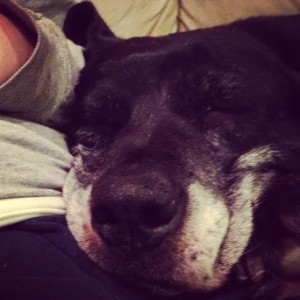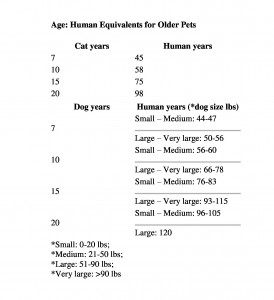- Do you subscribe to Dharma Dog Training’s Newsletter? You should.
- A Unique Campaign from The Humane Society of the United States
- Rabid bats in Omaha- Stay safe, prepared with these tips
- Springtime Activities in Omaha
- Mill Dog Monthly from Bailing Out Benji
- World Spay Day, Legislative Alert in Nebraska
- Attend the Nebraska Rescue Council’s monthly meeting this Saturday
- Five Hard-to-Ignore Reasons to Adopt!
- Paws in Pink to Benefit Breast Cancer Foundation
- VCA, Inc. Acquires MidWest Vet Specialists from Kansas State University
Senior Pets are a Blessing

In the U.S., 86 percent of pets that are surrendered to animal welfare organizations are turned over due to “owner-specific reasons,” meaning the inability to care for the pet for the remainder of its life. Sadly, this occurs all too often with owners of elderly pets according to Healthy Pets.
Japan is stepping up to plate, enacting pet-protective legislation. “In 2013, Japan enacted legislation that requires citizens to provide care for their pets for their entire lives – a respectable move since owning a pet is a lifetime commitment,” says Dr. Becker of Healthy Pets. Not only has Japan stepped up there but it also opened up a brand new retirement home for pets in June. This is first in their nation.
Often, dogs are dropped off at the local animal shelter, usually resulting in death for the animal or unpleasant circumstances at the very least. Japan is trying to minimize this by giving the option to the owner to take their dog to the doggy retirement center. It costs $1,000 a month, however. Each dog has access to a playground, swimming pool, on-call vet, grooming and their owners can visit at any time. This is certainly preferable than giving your dog an uncertain future like the 86 percent here in the U.S.
We realize that $1,000 is pricey and not everyone can afford that. Sometimes the only option is to take your animal to the shelter. We get that. If you can’t care for your animal to the end, we’re sorry for that. If you are interested in adopting pets, this gives you a wonderful opportunity. So, with that being said, please don’t overlook older pets at the shelters. Older pets can be a blessing. Read this article, titled, 10 Benefits of Adopting a Senior Pet, from Healthy Pets giving reasons as to why this statement I just made is true.
Older pets are usually more obedient, house trained and calm. They are less likely to be destructive to your house and don’t require as much activity as a puppy. Their personalities are already very apparent and you will automatically know if your personalities match up together to be a good fit. If you yourself are getting older, it might give you some peace of mind to know that you won’t have to worry about care for your animal when you can no longer provide it. That’s not meant to be harsh. It’s just how life is; we have to come to terms with that. It’ll make us better animal providers.
Some of you may be sitting there thinking, ‘Well, I know when I am getting old but how do I know if a pet is old or not?’
When a cat is 7 years old that is equivalent to a 45-year-old human. When a small dog is 7 that is equivalent to ages 44-47 and when a bigger dog is 7 that us 50-56 in human years.
The oldest recorded age of a cat is 34 years and the oldest recorded age of a dog is 29 years. They don’t usually live that long, but certainly can if they are happy, well taken care of and have good genetics.
The sleeping dog seen below is Fannie. She joined Mindi Callison’s family at age 11.5 after her owners dumped her in a kill shelter. She is blind. The dog in the feature image atop this article is the late, great Abby. Mindi, the founder of an animal adoption awareness group called Bailing Out Benji, got Abby when she was 15 after she lived a life of neglect outside. She was with Mindi for 13 months before passing away. 
“Sadly, our society has made it way too easy for people to dispose of their animals,” Mindi says. With Craigslist and swap groups on Facebook, one can see pets abandoned daily and it is heartbreaking. Most recently, Mindi saw an ad on a local swap site where a girl was “rehoming” her 6 month old cat. She said, ‘the cat is sweet but I don’t have that bond.’ But she had the cat as a young kitten and loved it until it got past that stage. There was also a story recently of a shelter in Miami who was swamped with owner surrenders around Thanksgiving because people wanted to travel. So they dumped their dog at the nearest shelter and left. Dogs were tied to the fence as the shelter scrambled to decide which to put down and which to keep.” Open admission shelters can euthanize an owner surrender on the spot. There is no hold time for those animals like there is for strays. This is why Mindi stresses the importance of donating, volunteering and fostering from no-kill rescues that pull from high-volume kill shelters. We can all surely do a better job in one way or another. Don’t surrender. If you have to, find a no-kill rescue or a person like Mindi who will love the pet until the end. If you are looking to adopt, don’t forget about older dogs. Never discount the possibility they could be the best fit.
The time will inevitably come, however, when your dog or cat is nearing the end. The signs that your animal is getting old parallel the signs that we are getting old:
- Tiring more quickly
- Development of vision or hearing problems
- Graying hair
- Behavioral changes like mental confusion, separation anxiety, excessive vocalization or accidents in the house
If you have an older pet or are looking to adopt an older animal then here are some “Special Considerations” taken from Healthy Pets, to keep in mind.
1. Increase vet visits to twice a year. They can look out for cancer, kidney diseases diabetes, senility, heart disease, liver disease, joint/bone disease and weakness, among other things.
2.Tweak the diet of your animal; older pets tend to need more protein.
3. Whole, unprocessed and preferably raw foods that have not been dehydrated or processed. (You should really be feeding this to your animals regardless of age, but especially important in the older years)
4. Engage in anti-aging activities. Exercises designed to maintain strength, flexibility and balance. Short frequent walks to maintain heart health. Massages to relieve muscle pain.
5. . Mental stimulation. “Pets can show signs of senility just like humans. Mental stimulation can help to keep your pet’s brain in proper working order. There are many ways to mentally stimulate your dog, such as going for a walk (especially on a new route), taking a ride in the car, or playtime in the backyard. Or, according to Robert T. Goldston, DVM, author of the veterinary textbook, Geriatrics and Gerontology of Dogs and Cats:“By far the best activity for mentally stimulating senior and geriatric dogs is the near constant [attention] they get from a young puppy.”
6. . Walks instead of jogs, tug games instead of chase games.
7. Ramps so your dog can still climb on things.
8. Frequent potty trips.
9. Adequate social interaction.
(For the full list visit Healthy Pets)
These small adjustments are not difficult or more challenging to make. Having an older pet can bring joy into your life just like a puppy would. Just be a little more cautious and caring and you are good to go. So next time you or a friend are out wanting to adopt, remember it is your obligation to care for your pet for the remainder of its life, and don’t be so quick to overlook the older, gentler ones. You’ll be glad you didn’t.
Related Posts
Latest News
-
3 Tips for Pet Owners on Training Rescue Dogs
Owning a rescue dog can take some work compared to...
- Posted 3 weeks ago
- 0
-
Choosing the Right Pet for Your Lifestyle
Are you thinking about getting a pet but unsure what...
- Posted 1 month ago
- 0
-
How to Make Your Rescue Pet as Comfortable as Possible
Did you bring home a new pet from a shelter...
- Posted 2 months ago
- 0
-
How Having A Pet Can Change Your Life
Having a pet can open your heart in ways that...
- Posted 7 months ago
- 0
-
How To Improve The Life Of Your Senior Pet
Do you have an elderly fur baby and want to...
- Posted 7 months ago
- 0
-
Springtime Activities To Enjoy With Your Furry Friends
Are you preparing for warmer weather and want some ideas...
- Posted 8 months ago
- 0
-
Pros And Cons Of Microchipping Your Pets
Have you considered whether your pets should be microchipped and...
- Posted 9 months ago
- 0























You must be logged in to post a comment Login